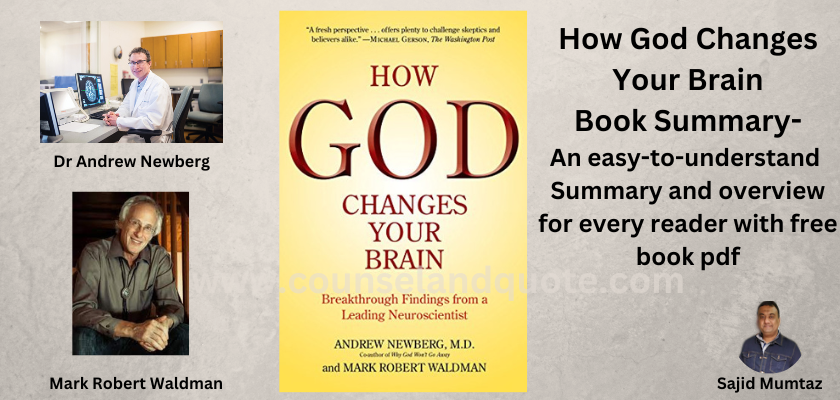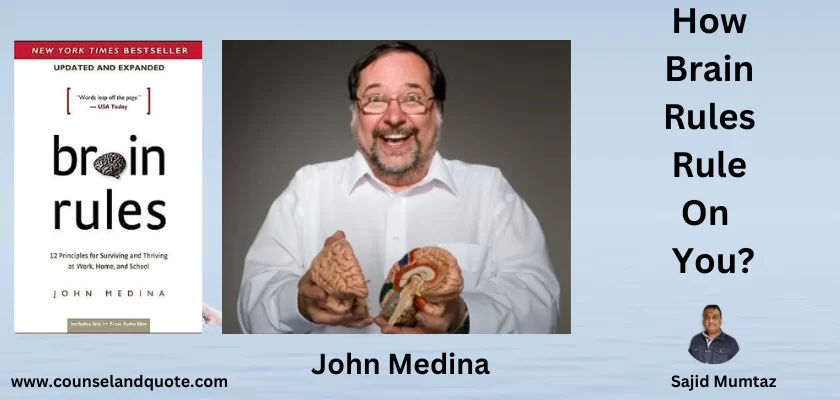The book “How God Changes Your Brain” was written by Andrew Newberg and Mark Robert Waldman in 2009.
This book “How God Changes Your Brain” is about the relationship between spirituality, religious experiences, and the human brain.
Andrew Newberg and Mark Robert Waldman examine how religious practices and beliefs can impact brain structure and functions leading to changes in cognitive and emotional processes.
They use neuroscience research and studies to explore the effects of meditation, prayer, and other spiritual practices on the brain.
Andrew Newberg and Mark Robert Waldman discuss how these changes can potentially lead to enhanced well-being and a sense of connection with a higher power.
The book delves into the neurological aspects of spirituality and how it may influence our brains.
This How God Changes Your Brain Book Summary is an attempt to give readers insight into the book’s teachings. The book summary also tells you about the impact of this research on our mundane and spiritual lives.
The free PDF of the book is also given to get the complete book. Download the book by clicking the download button.
[Also Read: The Brain Rules Book Summary & Download the Book Written by Dr John Medina]
Click on the image to read the book summary and get the complete book pdf.
Table of Contents
How God Changes Your Brain Book Pdf Free Download
How God Changes Your Brain Book Pdf Free Download
The download button is given below. Please click the button and download the original unabridged edition of the book.
| Book Name | How God Changes Your Brain |
| Author(s) | Andrew Newberg & Mark Robert Waldman |
| Language | English |
| Publisher | Ballantine Books |
| Book Pages | 368 pages |
| Get the Book | Amazon Link |
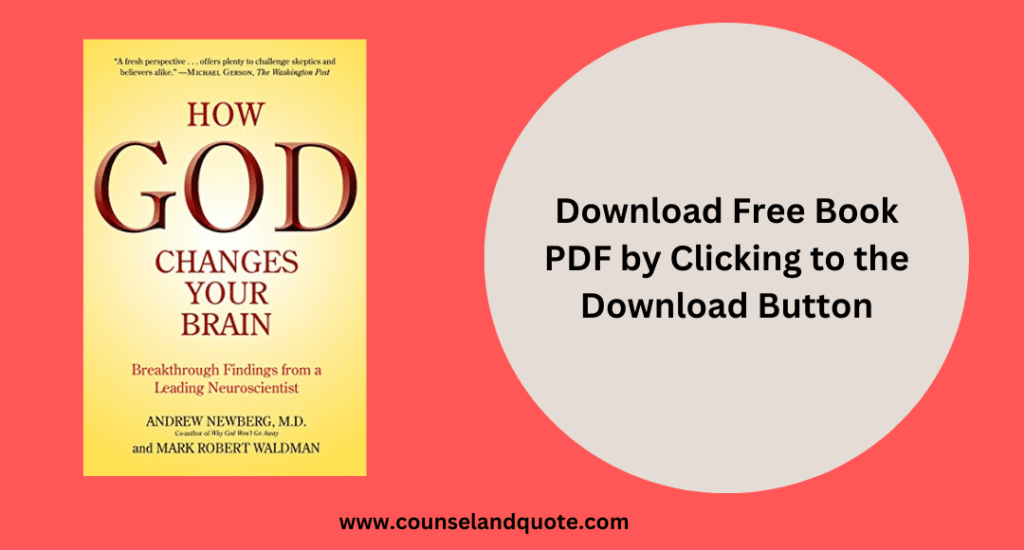
Click the link to get the complete book PDF free.
It is a must read book. If you want to understand your connection with God and how your brain functions, then read the book completely.
Who are Andrew Newberg and Mark Robert Waldman?
Andrew Newberg and Mark Robert Waldman are both well-known figures in the field of neuroscience and spirituality.
They have collaborated on research and written books that explore the intersection of brain science and spirituality. ‘How God Changes Your Brain’ is one of them.
Dr Andrew Newberg
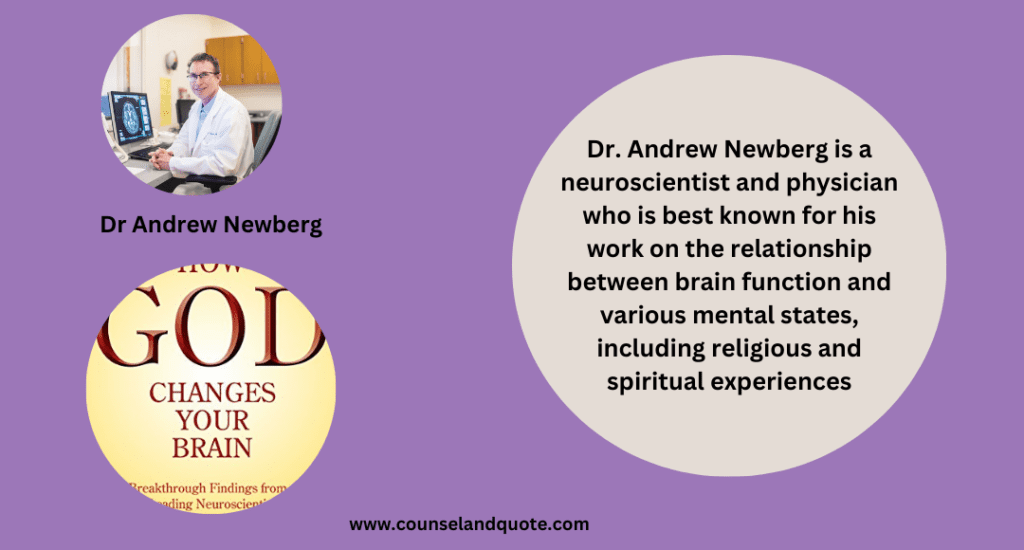
Dr. Andrew Newberg is a neuroscientist and physician who is best known for his work on the relationship between brain function and various mental states, including religious and spiritual experiences.
He is the Director of Research at the Marcus Institute of Integrative Health at Thomas Jefferson University and Hospital in Philadelphia, Pennsylvania.
Dr. Newberg has conducted numerous studies using neuroimaging techniques, such as SPECT (Single Photon Emission Computed Tomography) and fMRI (functional Magnetic Resonance Imaging), to investigate how religious and spiritual practices affect the brain.
He is the author of several books, including “Why We Believe What We Believe” and “How Enlightenment Changes Your Brain.” He is the co-author of the book “How God Changes Your Brain.”
Mark Robert Waldman

Mark Robert Waldman is a therapist, author, and associate fellow at the Center for Spirituality and the Mind at the University of Pennsylvania.
He has collaborated with Andrew Newberg on books that explore the neural basis of religious and spiritual experiences.
Waldman’s work often focuses on the practical applications of neuroscience and spirituality, helping individuals harness their brain’s potential for personal growth, happiness, and well-being.
He has co-authored books such as “How God Changes Your Brain” and “Words Can Change Your Brain,” which offer insights into how language and thought patterns can impact brain function and overall health.
[Also Read: Book Summary The Power of Your Subconscious Mind by Dr Joseph Murphy]
How God Changes Your Brain by Andrew Newberg and Mark Robert Waldman
How God Changes Your Brain Book- Topics & Overview
This book touches on the following topics in the most explicit detail.
1. Introduction to the Brain and Spirituality
The book begins by introducing the concept of neurotheology, which is the study of the neural basis of religious and spiritual experiences.
The authors propose that religious and spiritual practices can change the structure and function of the brain.
2. The Brain’s Religious Circuitry
Newberg and Waldman discuss the specific brain regions and circuits that are associated with religious experiences.
They highlight the importance of the limbic system, which plays a crucial role in emotions, and how it is affected by spirituality.
3. The Effects of Prayer and Meditation
The book explores the impact of prayer and meditation on the brain.
It discusses how regular prayer and meditation can lead to changes in brain activity, reducing stress and anxiety while enhancing feelings of well-being and happiness.
4. The Power of Rituals
Rituals in various religions are examined in terms of their neurological effects.
The authors argue that rituals can have a profound impact on the brain by providing a sense of belonging and purpose.
5. Altered States of Consciousness
The authors delve into altered states of consciousness induced by practices like fasting, chanting, and deep meditation.
These states are linked to changes in brain activity that can enhance a person’s spiritual experiences.
6. The Role of Belief
Belief systems and their impact on the brain are explored.
The book suggests that strong beliefs can influence cognitive functions and even alter perception.
7. The Science of Compassion
Newberg and Waldman discuss the neuroscience behind acts of compassion and love.
They argue that engaging in acts of kindness and love can lead to positive changes in the brain, promoting empathy and connection.
8. The Dark Side of Religion
The book acknowledges that while religious and spiritual practices can have positive effects on the brain, they can also be associated with negative consequences, such as extremism and intolerance.
The authors urge readers to approach religion and spirituality with discernment.
9. Practical Applications
The book concludes with practical advice on how individuals can apply the knowledge gained from neurotheology to improve their lives.
It emphasizes the importance of balance in one’s spiritual journey.
10. Critiques and Controversies
Critics of the book argue that it oversimplifies complex neurological processes and that the link between spirituality and brain changes is still an emerging field with limited empirical evidence.
“How God Changes Your Brain” explores the fascinating intersection of spirituality and neuroscience.
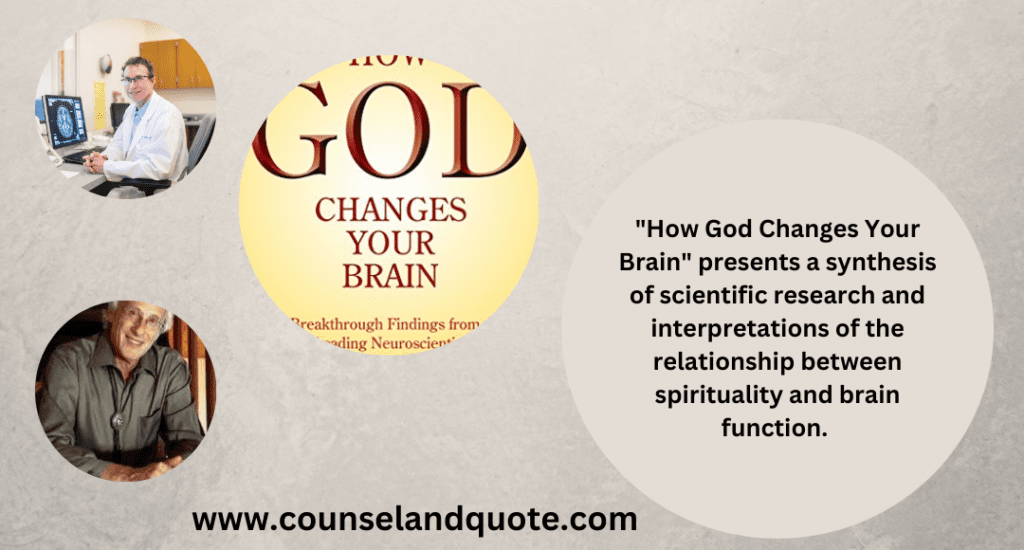
How God Changes Your Brain Book Summary
The summary of the book is shared below. It is given section-wise to make it lucid and attractive.
Headings and paragraphs are used to make it lucid and understandable for every reader.
It is an attempt to serve you better.
1- Neuroplasticity and Spiritual Practices
The authors emphasize the concept of neuroplasticity, which refers to the brain’s ability to reorganize itself in response to experiences and learning.
Engaging in spiritual practices such as meditation, prayer, and religious rituals can influence neural pathways and connections, potentially leading to long-term changes in brain structure.
2- Effects of Meditation and Prayer
The book discusses the effects of meditation and prayer on the brain. These practices are associated with relaxation, reduced anxiety, and altered states of consciousness.
The authors propose that regular meditation and prayer can contribute to changes in brain activity patterns and promote overall well-being.
3- Neurotransmitters and Positive Emotions
Spiritual experiences are linked to the release of certain neurotransmitters, such as dopamine and serotonin, which play a role in regulating mood and emotions.
Engaging in religious practices may lead to increased levels of these neurotransmitters, contributing to feelings of happiness, tranquillity, and reduced stress.
4- Altered States of Consciousness
The authors explore how religious experiences can induce altered states of consciousness.
These altered states are often characterized by a heightened sense of interconnectedness, a feeling of transcendence, and profound spiritual insights.
Brain imaging studies have shown distinct patterns of brain activity during these experiences.
5- Social Connection and Brain Health
Being part of a religious community and engaging in social activities within that community can have positive effects on brain health.
Social interactions and a sense of belonging are associated with increased well-being and reduced risk of cognitive decline.
6- Belief Systems and Brain Function
The book highlights the impact of belief systems on brain function. Different beliefs, whether religious or secular, can shape an individual’s perception of reality and influence brain activity.
The power of belief can affect how individuals experience the world and navigate challenges.
7- Critiques and Limitations
While the book presents intriguing ideas, some scientists have criticized the claims made in it.
The relationship between brain activity and spirituality is complex, and the interpretations of brain imaging data in the context of religious experiences are subject to various interpretations.
8- Balancing Skepticism and Openness
The authors encourage readers to approach the topic with a balance of skepticism and openness.
While they present scientific findings, they also acknowledge the limitations of current research and the need for further exploration in the field of neurotheology.
9- Stress Reduction and the Relaxation Response
Engaging in spiritual practices is linked to the activation of the “relaxation response.”
This physiological state counteracts the effects of stress and promotes relaxation, contributing to improved overall mental and physical health.
10- Cultural and Religious Differences
The authors acknowledge that the effects of spirituality on the brain can vary across cultures and religions.
Different belief systems and practices can lead to distinct brain activity patterns, reflecting the influence of cultural contexts.
11- Enhanced Perception of Reality
The book suggests that engaging in spiritual practices can lead to a heightened perception of reality, where individuals may experience a deeper connection to the world around them.
This enhanced perception is attributed to the altered states of consciousness induced by spiritual experiences.
12- Mind-Body Connection
The authors explore the interconnectedness of the mind and body in spiritual experiences.
They suggest that the brain’s response to spiritual practices can influence bodily functions, including the immune system and stress hormones.
13- Neurological Basis of Religious Experiences
The book delves into the brain regions associated with religious experiences, such as the prefrontal cortex, which is involved in decision-making and self-awareness, and the limbic system, responsible for emotions.
These regions are believed to play a role in shaping spiritual insights and feelings of transcendence.
14- The Role of Rituals
Rituals and religious practices are discussed as a means of reinforcing beliefs and creating a sense of community.
Participating in rituals can lead to a sense of belonging and contribute to positive emotions.
15- Neural Correlates of Mystical Experiences
The authors examine mystical experiences, characterized by a sense of unity with the universe or a higher power.
These experiences are associated with unique brain activity patterns that differ from ordinary waking states.
16- Applying Spiritual Practices in Daily Life
The book provides insights into how readers can incorporate spiritual practices into their daily routines to promote brain health and well-being.
Small changes in lifestyle, such as practising gratitude or engaging in acts of kindness, can have positive effects on the brain.
17- Ethical Considerations
The authors address ethical implications related to using spiritual practices for personal development.
They discuss how ethical behaviour and compassion are integral to positive brain changes and overall spiritual growth.
Conclusion
The book “How God Changes Your Brain” presents a synthesis of scientific research and interpretations of the relationship between spirituality and brain function.
While it offers intriguing insights, the field of neurotheology is still a subject of ongoing research and discussion.
For a comprehensive understanding, consider reading the book itself.
It provides case studies, examples, and references to the scientific studies discussed.
Thanks for reading the book summary.
Please share it with your friends and relatives.
May God Bless You. Amen.
Thank You.
